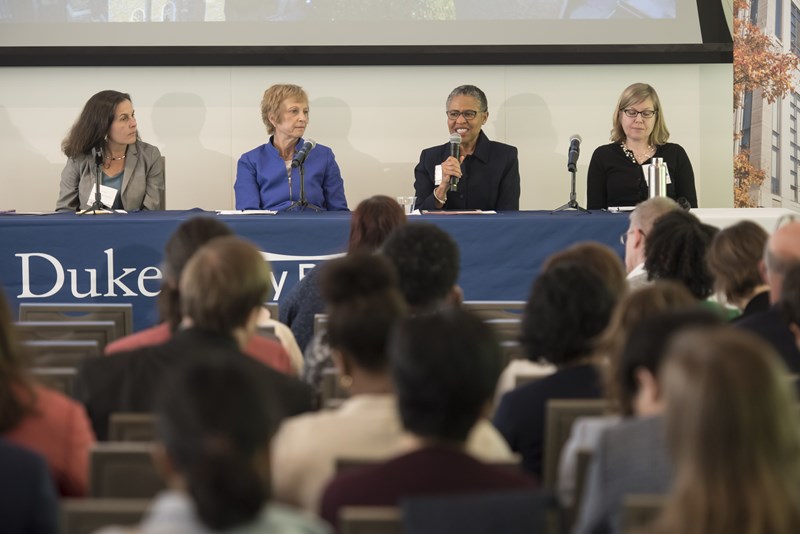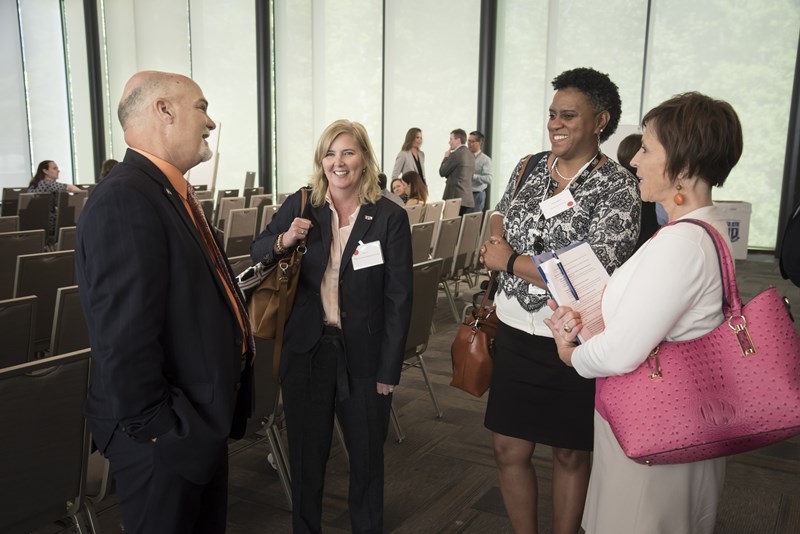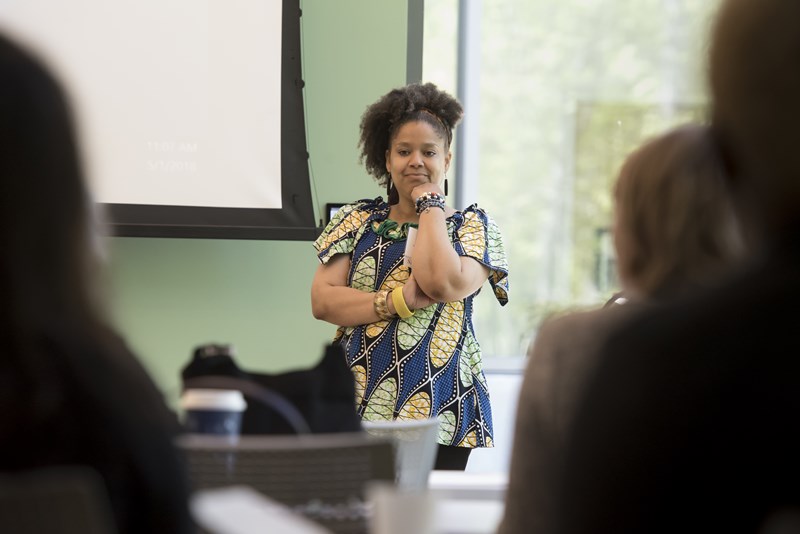Opioid misuse is a major epidemic across the nation. Local and state officials bear the burden of responses to the epidemic and need assistance coordinating research and resources.
The Institutional Member Forum, held on on May 1, 2018, and hosted by Duke Policy Bridge at the Sanford School of Public Policy and APPAM, connected the worlds of research and policy across this escalating public health epidemic. (Read the conversation on Twitter at #DukeOpioidForum).
Continuing the dialogue around evidence-based policymaking discussed at last spring’s APPAM Institutional Member Forum, the forum was a valuable opportunity for academics, researchers, and policy officials to exchange best practices for research and policy support in the face of this crisis.
The opening panel session, Lessons Learned and Policy Needs, focused on the need for research-policy partnerships in the opioid crisis. “"This is a chronic illness. We have to think very comprehensively about our response," said Robin Newhouse, Dean and Distinguished Professor at Indiana University School of Nursing. "None of us can do it alone; it will take many partners."
The conversation centered on the types of necessary partnerships, as well as what is needed in each collaboration.
 "Both researchers and policymakers need to continue asking themselves ‘who is better off because of what we know and what we've done?’ The answer has to be the communities we're serving,” said Jewel Mullen from Policies for Action and a former public health commissioner in Connecticut.
"Both researchers and policymakers need to continue asking themselves ‘who is better off because of what we know and what we've done?’ The answer has to be the communities we're serving,” said Jewel Mullen from Policies for Action and a former public health commissioner in Connecticut.
Patricia Strach, Associate Professor at the University at Albany Rockefeller College of Public Affairs & Policy, added: “How can research have a real-world impact? We have to provide information that is timely and accessible for policymakers. It means understanding politics and the calendar that policymakers are working under.”
Other effective opportunities for partnership include organizations working directly in the communities. Strach encouraged researchers to pair with these local initiatives to design studies and evaluate programs. She coined the term “pracademics” – not just academics and or practitioners, but finding a middle ground with organization and policymaker partners to create impactful change.
In the breakout session on providing a system of care in underserved and rural communities, Strach discussed the regional challenges for new policies. “When we talk about policy solutions, we have to think about the places people are, and the kinds of resources they have, and the constraints they operate under.” There is not a simple, one size fits all, solution.
The closing panel session focused on the role of big data in the opioid crisis monitoring and research. Moderator Erich Huang, Co-Director of Duke Forge, and Assistant Dean for Biomedical Informatics at Duke University School of Medicine, led an insightful discussion on the challenges of using data from multiple sources as well as security concerns.
 The panelists agreed that large data sets are challenging: April Young, Assistant Professor at the University of Kentucky College of Public Health, called them “complex, unwieldy, and incomplete.” Christopher Ruhm, Professor of Public Policy and Economics at the University of Virginia Frank Batten School of Leadership and Public Policy, identified big data as a “of a volume and type that is too large to analyze using the kinds of statistical tools that I was taught in graduate school.” Peter Kreiner, Senior Scientist at the Schneider Institute for Health Policy at Brandeis University, agreed: “Big data really calls for different analytic tools.”
The panelists agreed that large data sets are challenging: April Young, Assistant Professor at the University of Kentucky College of Public Health, called them “complex, unwieldy, and incomplete.” Christopher Ruhm, Professor of Public Policy and Economics at the University of Virginia Frank Batten School of Leadership and Public Policy, identified big data as a “of a volume and type that is too large to analyze using the kinds of statistical tools that I was taught in graduate school.” Peter Kreiner, Senior Scientist at the Schneider Institute for Health Policy at Brandeis University, agreed: “Big data really calls for different analytic tools.”
Often because of privacy concerns and the risk of identifying individuals, researchers find it difficult to combine data sets from multiple sources. Huang said that big data can get small and individualized very quickly.
“Many of these data sets are created by data scraping tools, which raises all sorts of issues around privacy,” said Kreiner.
“Clearly privacy is an enormous issue and we need to be held responsible for maintaining privacy,” said Ruhm. “I will say, though, in a way I worry if we get over-concerned about privacy for these kinds of uses, we may miss the bigger potential abuse. We have good information on the private sector where these linkages are going on essentially unconstrained, and so I do worry a bit that we place a lot of energy and restrictions in an area where I don’t think we’re seeing major violations.”
Huang agreed that the balance between maintaining privacy and using data to create lasting solutions can be a challenge: “I can see us paralyzing ourselves if we worry too much.”
 A lack of state-level data also creates voids. “When things don't touch a state system, we don't have information on those people,” said Dana Bernson, Principal Investigator and Lead Epidemiologist in the Massachusetts Department of Public Health.
A lack of state-level data also creates voids. “When things don't touch a state system, we don't have information on those people,” said Dana Bernson, Principal Investigator and Lead Epidemiologist in the Massachusetts Department of Public Health.
Non-fatal overdoses, as well as use of other illicit drugs, are data holes the panelists have struggled to fill in shaping interventions. “It's clear that individuals do not act individually. It's difficult to capture those connections,” said Kreiner. “If we understood people's behavior in a context of a network, that would help direct points of highest leverage.”
A knowledge of those connections in a timely way is imperative. “For advocates and for people in government, getting correct facts are really important” said Ruhm. “And the other thing is, faster facts. Understand what’s going on now rather than what went on three years ago.”
“Often prescribers don't even know that their patient has had a non-fatal overdose,” said Bernson. “How can we identify high-risk people in settings in which interventions can be timely, targeted, and hopefully effective?”
Please use the forum recording for the full conversations, and follow the conversation on Twitter at #DukeOpioidForum.
Timestamps:
-
00:14:30 – Welcome
-
00:32:50 – Lessons Learned and Policy Needs Panel
-
1:44:30 – Morning Breakout: Providing a system of care in underserved and rural communities
-
4:11:00 – Afternoon Breakout: Providing a system of care in underserved and rural communities
-
5:41:00 – Breakout Session Summaries
-
6:13:00 – Big Data Panel